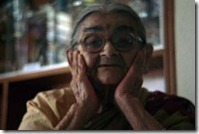 Aging is a difficult process no matter what culture you identify with. Slowly losing your independence as well as your physical health can take a toll on a person both mentally and physically. Aging in a place different from your country of origin can make the process even more challenging for the elder as well as for his/her family.
Aging is a difficult process no matter what culture you identify with. Slowly losing your independence as well as your physical health can take a toll on a person both mentally and physically. Aging in a place different from your country of origin can make the process even more challenging for the elder as well as for his/her family.
With many South Asians having immigrated to countries such as the UK, Canada and the US, as their parents age sometimes the only option is to bring them to live abroad with the children. As the population of immigrant elder South Asians rises in each of these countries, more and more people are noticing the high rates depression that are prevalent in this specific group. In fact, research has shown that about 20% of immigrant South Asian elders (ages 65 years and above) are at least mildly depressed.
Depression is mistakenly understood a natural part of aging; however, this is not the case. Depression in the elder population occurs for numerous reasons. Here is a breakdown of the most common factors for depression in the immigrant South Asian elderly population.
Social isolation. South Asian elders lose their network and connections from their country of origin when they immigrate and often have trouble meeting people of their age and background in their new home. This can result in feelings of depression, as can living alone. Some South Asian elderly people can only speak in their native tongue, making it difficult to connect with or talk to any one other than people in their community. Social isolation, no matter the cause, results in increased stress in any individual. The longer the stress persists, the more likely the individual will develop depression.
Constant grief. As people age, more and more of their relatives and friends from their generation begin to pass away, leaving the elder to constantly grieve. This brings up feelings about one’s own mortality and can increase feelings of loneliness, also factors in developing depression. South Asian elders who are particularly religious may isolate themselves, not wanting to go to social gatherings or celebrations to honor those who have passed. This lessened social contact is a factor for developing depression as well.
Acculturation level. Research has shown that the more the South Asian elderly population can assimilate and take on aspects of the majority culture where they live, the more protected they will be from developing depression. Holding tight to one’s home culture without incorporating aspects of the dominant culture makes it harder for the elderly person to adapt to their new lifestyle. That, coupled with the culture clash that they might experience both contribute to significant emotional distress and can result in developing depression. In addition, a stronger level of agreement with South Asian culture can make it more difficult for the elderly to obtain services that are culturally appropriate for their needs (e.g. specific temples, doctors who know their language, etc.).
Loss of agency. South Asians who are aging often live with at least one of their children or sometimes even in a nursing home. Losing independence and experiencing a shift in the family where the child now becomes the caretaker affects the individual’s self-esteem and feelings of self-worth. They may feel like they are a burden to their family, feel worthless, or feel as if they have no reason to live. They may isolate themselves further in effort to avoid creating trouble for their children. All of these are strong predictive factors for developing depression.
Physical ailments. Research has identified that the rate of depression is 10 times higher in medically ill seniors than the general population. One explanation for this could be that many medical problems, especially at an advanced age, result in loss of functionality or cognitive ability such as with Alzheimer’s Disease or a broken hip. Many elderly South Asians do not get the same amount of exercise they would have in their home countries, partially because it may not be safe to do so in the new country and partially because medical conditions may not allow them to move as well. Lack of exercise and movement can also contribute to the development of depression. In addition, many medications can have mood changes or depression as a side effect.
Depression is not a normal and natural part of aging and should be addressed and treated immediately to increase the quality of life. Be watchful of signs of depression and if you are concerned about a South Asian elder showing signs of depression, please speak to his/her physician about it for a list of treatment options.
